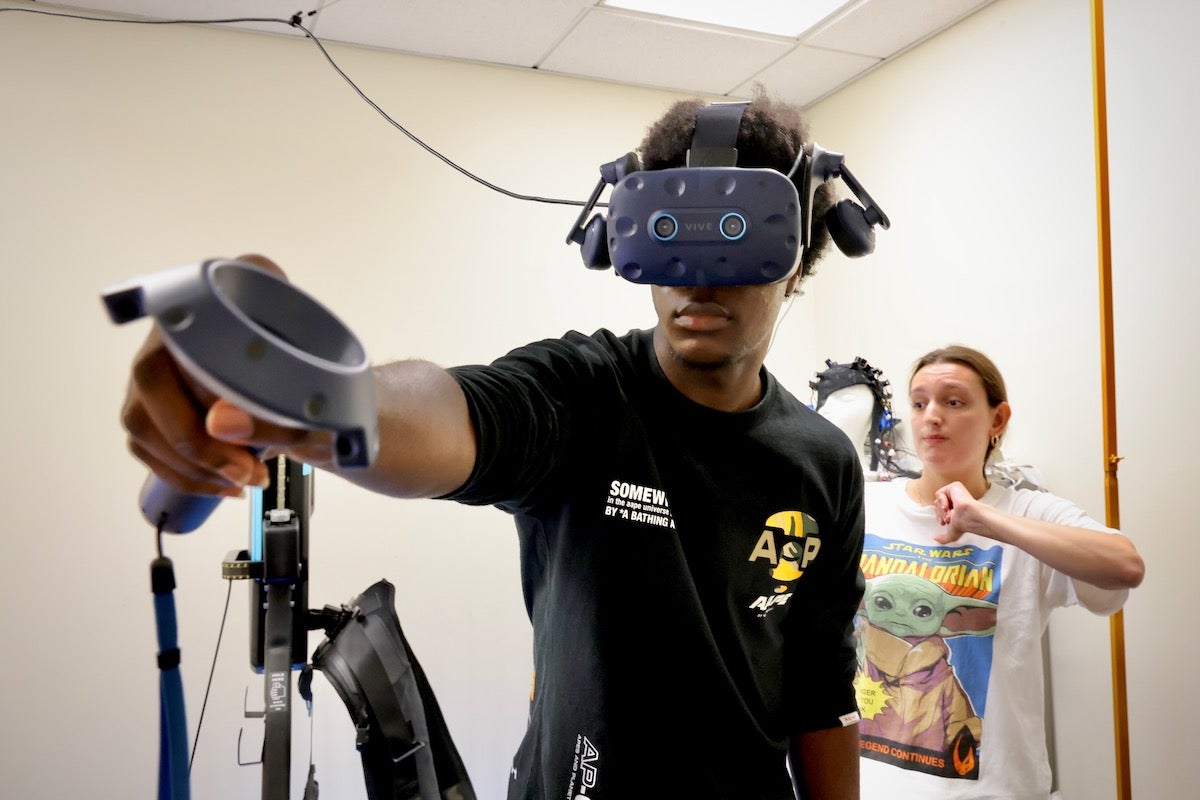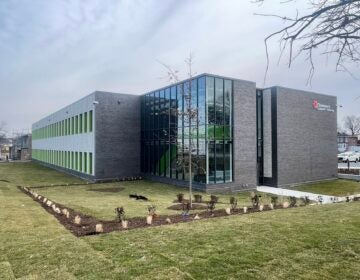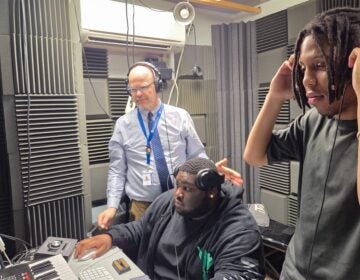Drexel’s Biomed Summer Academy attracts high schoolers interested in STEM careers
The four-week program provides interactive learning about the frontiers of biomedical research.
Listen 1:34
Danielle Shoshany and Mert Deniz Polat, instructors at Drexel University's Biomed Summer Academy, introduce students to a device that uses light to measure blood oxygenation in the brain. Polat adds a drop of dye to a container of simulated brain tissue, which allows them to test the device before trying it on patients. (Emma Lee/WHYY)
From Philly and the Pa. suburbs to South Jersey and Delaware, what would you like WHYY News to cover? Let us know!
Levi Heckard, 17, attends Cedar Crest High School in Lebanon, Pennsylvania, and is interested in pursuing a career helping people with the latest technology related to creating artificial limbs and organs.
“We are currently working on a group project that is an artificial kidney filtration system,” he said. “Building more prosthetics to help people whose limbs are not functioning properly would help people get a second chance at life.”
Cecil Ekhelar, a 17-year-old student at Trinity Hall High School in Tinton Falls, New Jersey, said she wants to study biomedical engineering in college and is fascinated by the study of the brain.
They are among dozens of 11th- and 12th-grade students who are attending Drexel University’s four-week Biomed Summer Academy, for those interested in science, technology, engineering and math, or STEM, from high schools in the Philadelphia area and beyond, including Abington, Central, Lower Merion, William Penn Charter and Upper Darby high schools.
Between 2023 and 2033, the number of STEM jobs is expected to rise by more than 10%, compared to 3.6% growth in non-STEM jobs, according to a 2024 report by the U.S. Bureau of Labor Statistics.
But a 2021 report by the Harvard Gazette reported that only 20% of high school graduates were prepared for college-level STEM courses.
In the Biomed Summer Academy, students are exposed to laboratory and research skills through interactive learning. In addition, they work on projects such as tissue engineering, neural circuit engineering and biomaterials.

Bioethics, gene editing, health equity and lab safety are among the other topics explored.
The students are learning about some of the latest biomedical technology that also has applications in artificial intelligence, aviation, medical science and robotics, said Hasan Ayaz, a professor in Drexel University’s School of Biomedical Engineering, Science and Health Systems.
“Today is about neuroengineering and we teach students about different methods and techniques we use to study human brain function,” Ayaz said. “We develop brain-computer interfaces that allow individuals to control computers, wheelchairs or other technologies around them just by thinking, or navigating virtual reality or communicating with a humanoid robot.”
For example, the students were introduced to a test that measures electrical activity in the brain, known as an electroencephalogram, or EEG, he said.
“We use variable neuroimaging techniques to capture brain signals as individuals perform different tasks,” Ayaz said. “They go through hands-on experiences with these technologies to understand what they do, to get an introduction to them.”

Hopefully they become more interested and want to learn more in the future, he said.
“We then apply these techniques to human-machine interaction to improve the technologies and complex systems that can go from aviation in a cockpit situation all the way to surgical tools for surgeons and medical students to learn these skills,” Ayaz said.
EEGs are also used in a health care setting to diagnose various brain disorders, he said.
A variety of subjects and projects
In one room, a group of students interacted with a humanoid robot named Pepper, asking questions and participating in an experiment.

In another room, Danielle Shoshany, 26, a doctoral student in Drexel’s school of biomedical engineering and a mentor in the summer academy, worked on testing and fine-tuning medical devices.
“Today, we are creating an environment that mimics the brain, including the extracerebral layers as well as the cerebral tissue, in order to test some of our optical devices,” she said. “The students get to see how we test these devices before they are translated into a preclinical or clinical setting.”
Doing so, said Kurtulus Izzetoglu, associate professor in Drexel’s school of biomedical engineering, is a precursor to animal and human testing.

Editor’s Note: This story is part of a series that explores the impact of creativity on student learning and success. WHYY and this series are supported by the Marrazzo Family Foundation, a foundation focused on fostering creativity in Philadelphia youth, which is led by Ellie and Jeffrey Marrazzo. WHYY News produces independent, fact-based news content for audiences in Greater Philadelphia, Delaware and South Jersey.

Get daily updates from WHYY News!
WHYY is your source for fact-based, in-depth journalism and information. As a nonprofit organization, we rely on financial support from readers like you. Please give today.








